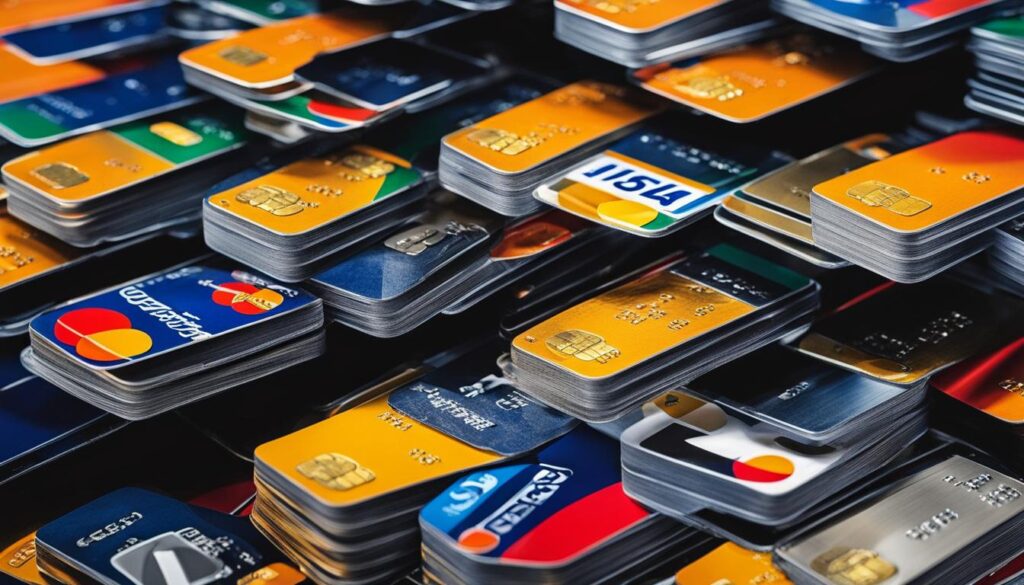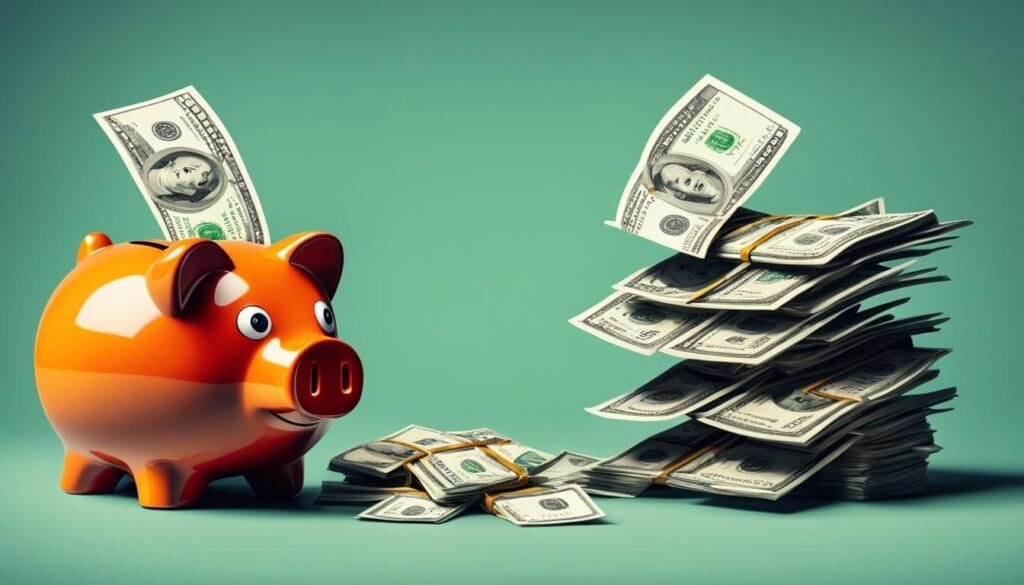Credit card psychology is a topic that has drawn the attention of experts in recent years. The rise of traits associated with narcissism, such as grandiosity and a lack of empathy, has led to negative consequences when it comes to money. Narcissists use money as a tool to manipulate and control others, which can have significant impacts on personal relationships as well as financial well-being. Understanding the toxic money habits of narcissists is essential in order to avoid falling victim to their manipulations.
Key Takeaways:
- Credit card psychology and the influence of narcissists on money habits have become a significant concern.
- Narcissists use money as a tool for manipulation and control, impacting personal relationships and financial well-being.
- Recognizing the toxic money habits of narcissists is crucial for avoiding their manipulations.
- Protecting oneself from narcissistic influence requires awareness and understanding of their tactics.
- Building immunity to narcissists and managing finances effectively is vital for maintaining financial well-being.
The Most Toxic Money Habits of Narcissists
Narcissists exhibit several toxic money habits that can be detrimental to those around them. Understanding these unhealthy behaviors is vital for protecting oneself from their manipulations.
1. Secretive about Finances
Narcissists tend to keep their financial matters hidden from their partners or colleagues, making one-sided money decisions without consulting others.
2. Generosity in Public, Stingy in Private
While narcissists may appear generous and extravagant in public, they are often selfish and unwilling to contribute financially in private. This behavior can be isolating for those closest to them.
3. Skimping on Essentials, Indulging in Unnecessary Spending
Narcissists prioritize self-serving, indulgent expenses while neglecting essential needs. They may skimp on basics like food, clothing, or healthcare, yet splurge on luxury items for themselves.
4. Hypocrisy and Enforcing Rules on Others
Narcissists demonstrate hypocrisy when it comes to money management. They hold others accountable to strict financial rules but disregard those principles themselves, further highlighting their self-centered nature.
5. Punitive with Money
Narcissists use money as a tool for punishment or control. They may reward or withhold funds based on their own whims, manipulating and exerting power over others through financial means.
These toxic money habits can have serious financial consequences for the victims of narcissistic behavior. It is important to recognize and address these patterns to protect one’s financial well-being. By setting boundaries, maintaining open communication, and seeking support, individuals can navigate the complexities of dealing with narcissists and their detrimental influence on personal finances.
| Toxic Money Habits of Narcissists | |
|---|---|
| 1. | Secretive about Finances |
| 2. | Generosity in Public, Stingy in Private |
| 3. | Skimping on Essentials, Indulging in Unnecessary Spending |
| 4. | Hypocrisy and Enforcing Rules on Others |
| 5. | Punitive with Money |
The Dangers of Using Credit Cards
While credit cards offer convenience, they also pose risks to personal finances. It’s important to understand the potential hazards that come with credit card usage in order to make informed financial decisions and protect one’s financial well-being.
“Credit cards make it easy to overspend, leading to potential debt and financial strain.”
One of the main dangers associated with credit cards is the ease of overspending. With the availability of credit at their fingertips, individuals may be tempted to make impulsive purchases and exceed their budgetary limits. This can quickly lead to accumulating debt and financial strain.
Another hazard of credit cards is the presence of high interest rates. If the balance on a credit card is not paid in full each month, the remaining balance will accrue interest, making the purchases more expensive in the long run.
Accumulating debt not only puts individuals at risk of financial instability but can also have a negative impact on their credit scores. High levels of debt can lower credit scores, making it more challenging to secure loans or access favorable interest rates in the future.
“It is important to be aware of one’s credit utilization ratio, which is the amount of debt compared to the total credit available.”
Credit utilization ratio is the percentage of available credit that an individual has utilized. A high credit utilization ratio can negatively impact credit scores, as it indicates a higher level of debt compared to the credit available. It is recommended to keep the credit utilization ratio below 30% to maintain a healthy credit score.
To illustrate the potential dangers of credit card usage, here is a table showcasing the impact of high interest rates and credit utilization ratio on credit scores:
| Scenario | Interest Rate | Credit Utilization Ratio | Credit Score |
|---|---|---|---|
| Low interest rate, low credit utilization ratio | 10% | 20% | Excellent (above 750) |
| High interest rate, low credit utilization ratio | 25% | 20% | Good (700-749) |
| Low interest rate, high credit utilization ratio | 10% | 50% | Fair (650-699) |
| High interest rate, high credit utilization ratio | 25% | 50% | Poor (below 650) |

Understanding the dangers of credit card use is crucial for maintaining financial well-being. By being cautious with spending, paying off balances in full each month, and keeping credit utilization ratios low, individuals can minimize the potential risks associated with credit cards and protect their financial stability.
Building Immunity to Narcissists and Credit Card Influence
Building immunity to narcissists and avoiding the negative influence of credit cards requires specific strategies. Here are some key tactics to protect yourself:
1. Develop Self-Control
When it comes to money, developing self-control is crucial for safeguarding yourself from narcissistic manipulation. Recognize your own spending triggers and practice restraint to avoid falling prey to impulsive purchases or pressure from others.
2. Implement Budgeting
Implementing a budget is an effective way to maintain financial discipline and prevent overspending. By setting clear spending limits and tracking your expenses, you can ensure that your money is allocated wisely and in alignment with your financial goals.
3. Understand Interest Rates
It is essential to be aware of high interest rates and the impact they can have on the cost of your purchases. By understanding how interest accrues and evaluating the long-term costs, you can make informed financial decisions and avoid unnecessary debt.
4. Monitor Credit Utilization Ratio and Credit Score
Maintaining a low credit utilization ratio is vital for protecting yourself against credit card dependence. Aim to keep your credit utilization below 30% by responsibly managing your credit cards and paying off balances regularly. Additionally, monitoring your credit score can provide valuable insights into your financial health and alert you to any potential issues.
5. Set Clear Boundaries
When dealing with narcissists, it is crucial to set clear boundaries and stick to them. Recognize their manipulative tactics and prioritize your own well-being. By asserting your financial independence and establishing boundaries, you can avoid being influenced or exploited.
By following these strategies, individuals can build immunity to narcissistic behavior and maintain healthy financial habits. It is important to prioritize self-awareness and actively protect yourself from the negative influence of credit cards and narcissistic individuals.

Bold, self-directed steps are essential to breaking free from the toxic cycle of narcissism and financial vulnerability. Implementing the strategies discussed here empowers individuals to regain control of their finances and personal lives.
What Psychological Tactics Do Credit Card Companies Use to Influence Consumers?
Credit card companies use various psychological tactics to influence consumers. For example, they may offer enticing rewards and exclusive offers to encourage spending. Additionally, they may create a sense of urgency or scarcity to prompt immediate action. Understanding these store credit card facts can help consumers make informed financial decisions.
Conclusion
Understanding the intricacies of credit card psychology is crucial for managing finances effectively and avoiding narcissistic manipulation. By recognizing the toxic money habits of narcissists, individuals can protect themselves from financial exploitation and maintain their overall well-being.
Implementing strategies such as self-control, budgeting, and setting boundaries is essential in building immunity to narcissistic behavior. Developing self-control helps individuals resist impulsive buying decisions and enables them to make wise financial choices. A well-planned budget ensures that money is allocated appropriately, facilitating better financial management.
In addition, setting clear boundaries with narcissistic individuals prevents them from exerting control over one’s finances and personal life. By being aware of their manipulative tactics, individuals can avoid falling victim to their schemes and maintain their financial independence.
Ultimately, prioritizing financial education and awareness is key to navigating the complex world of credit card psychology. By staying informed and understanding the risks associated with credit card use, individuals can protect themselves, make informed financial decisions, and secure their financial futures.
FAQ
What is credit card psychology?
Credit card psychology refers to the understanding of how credit cards influence consumer behavior and spending habits. It involves analyzing the psychological effects of credit cards and how they can shape a person’s money mindset and behavior.
What are the toxic money habits of narcissists?
Narcissists exhibit several toxic money habits, such as being secretive about their finances, making one-sided money decisions, being generous in public but stingy in private, skimping on essentials while indulging in unnecessary spending, behaving hypocritically, and using money as a tool for punishment or reward.
What dangers are associated with using credit cards?
Using credit cards can lead to overspending, potential debt, and financial strain. High interest rates can make purchases more expensive if the balance is not paid in full, accumulating debt can negatively impact credit scores and strain relationships, and maintaining a high credit utilization ratio can be detrimental to financial well-being.
How can I build immunity to narcissists and credit card influence?
Building immunity to narcissists involves strategies such as developing self-control when it comes to money, implementing a budget to maintain financial discipline, being aware of high interest rates and making informed financial decisions, maintaining a low credit utilization ratio and a good credit score, and setting clear boundaries with narcissists to avoid their manipulative tactics.
Why is it important to understand credit card psychology?
Understanding credit card psychology is essential for managing finances and avoiding manipulation and negative influences. By being aware of toxic money habits of narcissists and the dangers of credit card use, individuals can protect themselves, maintain healthy financial habits, and navigate the complexities of credit card psychology.
Source Links
- https://www.investopedia.com/articles/younginvestors/08/purchase-financing.asp
- https://www.cnbc.com/2022/04/14/narcissists-share-these-5-toxic-money-habits-that-are-often-ignored-says-psychologist.html
- https://www.usatoday.com/story/life/health-wellness/2023/09/26/narcissists-hate-these-traits-use-them-to-build-narcissism-immunity/70964942007/

